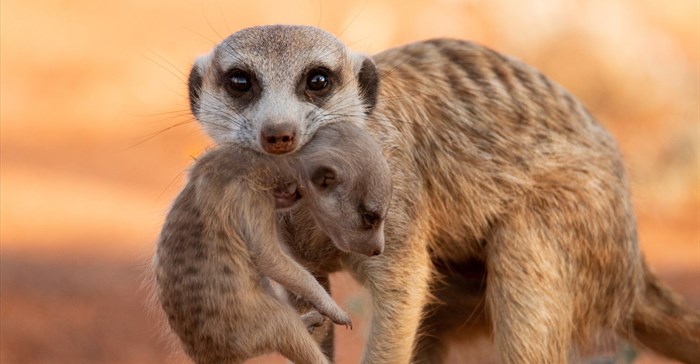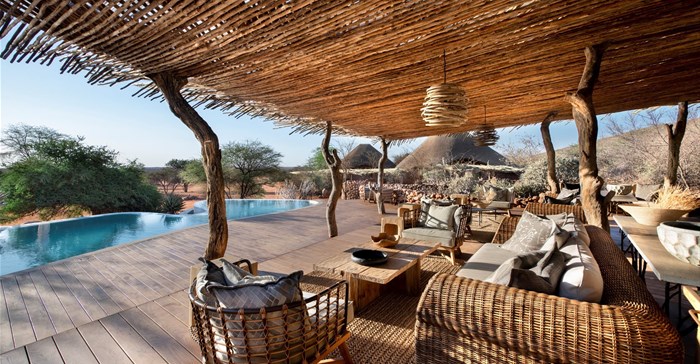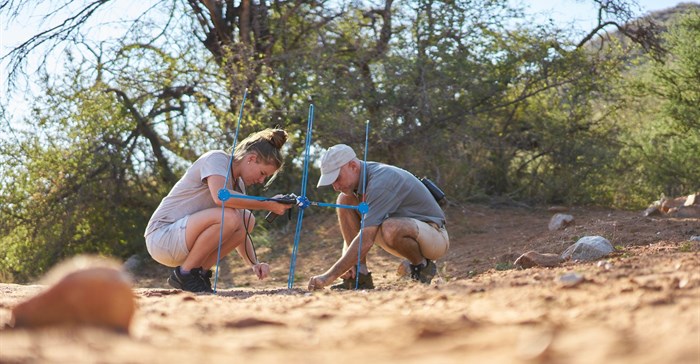Celebrating conservation efforts at Tswalu Kalahari Reserve amidst Covid-19

Like with many other industries, the world over, it has taken innovation, determination, and adaptability to continue business activities. Those who could not innovate or did not have a safety net of funding support unfortunately shut down. Many organisations have retrenched key staff, which has further hampered their ability to protect species at risk.
Whilst, Tswalu Kalahari Reserve is well-known as one of South Africa’s foremost ecotourism destination, what many do not know, is that it is primarily a major conservation project, with numerous ongoing research initiatives geared towards understanding and conserving key species as well as this sensitive ecosystem.
Wildlife haven
It was built to become this magnificent place for research, conservation, and preservation of species over more than two decades. This, after Nicky Oppenheimer, chairman of Oppenheimer Generations and a lifelong conservationist bought it from Stephen Boler, who had run the property as a hunting preserve until 1998.
The first thing Mr Oppenheimer did, was focus on returning the Kalahari to itself. He then undertook the colossal task of re-wilding, introducing breeding programmes for rare and endangered species, indigenous to the Kalahari. This reversed decades of overgrazing and provided a haven for cheetahs and other predators. He also returned the true Kalahari lion to the property.
Since then, more farms have been acquired and added to these Kalahari oases. This project has turned it into the biggest private wildlife reserve in South Africa with the lofty summits of the Korannaberg running through it from end to end. Literally, Tswalu has become one of the modern-day, true conservation success stories. The dunes to the west of Tswalu continue as far as the eye can see, and the property is truly one of Africa’s last great true wildernesses.

Tswalu provides accommodation with two camps; Motse, which can accommodate up to 20 guests, and the smaller Tarkuni. Both are five-star oasis of food and comfort with blissful outdoor vistas and wonder, committed staff. One of the great benefits of staying here is having your own exclusive vehicle, guide and tracker to explore this wild place with nobody else in sight.
Whilst Tswalu has been unable to offer accommodation and the enchanting wildlife experience during this period, it is incredible that research and conservation efforts have not been halted during this pandemic, in fact, research projects undertaken at the research centre continue at full speed, as well as being ready to facilitate further research projects.
Through the Tswalu Foundation, which was developed in 2008 primarily to support ecological research at Tswalu, unique research opportunities have continued to become available for researchers to add to their collective knowledge of the Kalahari. The Foundation has a strong network of scientists and numerous research projects have been sanctioned by the Oppenheimer family.
These projects range from insects through to pangolin and contribute to our understanding of the uniqueness, complexity, and diversity of this wonderful land. Understanding the relationships and connectivity of ecosystems is one of the major challenges in modern ecology. The Foundation is also a platform upon which local and international visitors can become involved in community and environmental research on the reserve.
The Artists in Residence Programme (AiR) in an innovative programme, managed through the Tswalu Foundation, initiated to further support research on Tswalu through the generation of income for research as well as provide artists a platform to be inspired and showcase their work. The AiR program is guided by Mark Read and his team at the Everard Read gallery in Johannesburg, which have created a recognised arts and culture brand. This year’s exhibition was adapted to a virtual experience with an electronic gallery to ensure that the talent of South African artists as well as the uncovering of new artistic talent continued.
Ecological management
The KEEP (Kalahari Endangered Ecosystem Project) project has forged ahead, amidst the pandemic. It was formed to try to answer some of the pressing issues related specifically to climate change effects in the Southern Kalahari region. A key feature of KEEP is that it links several historical projects, as well as, new research projects under one banner to collect and collate data more efficiently and effectively, particularly with regards to key species occurring on Tswalu.

This data enables the conservation team to be at the cutting edge of the ecological management of Tswalu. The KEEP project is the first of its kind, focusing on the “food web” and how the cascading effects of climate change impacts a myriad of species which in turn affect others. It also involves top scientists from various universities working together for a common purpose.
Among others, KEEP aims to look at small mammals, pangolins, Cape cobras and boomslang, bat-eared foxes, small mammals, barn owls, and sociable weavers, to discover how these species may cope with changing temperatures and rainfall through their physiological and behavioural adaptations. Long-term vegetation monitoring and collection of weather data is also integral to the success of KEEP. KEEP is but one of the many research programs undertaken on the property.
We commend the efforts that have been implemented to protect rhinos from being poached. When the pandemic threatened livelihoods, poaching increased and it has taken further effort and resources and technological intervention to implement anti-poaching surveillance and systems. The staff who work at Tswalu, continued in an innovative way. They adapted their duties to become the protectors of endangered species. The security team at Tswalu are effective in not only protect Tswalu’ s assets, but have been successful in the community, assisting with poaching incidences many kilometres from the Tswalu boundary.
In Setswana, Tswalu means a 'new beginning' and that is exactly what is delivered: a fresh era of hope for the people and wildlife of one of South Africa’s last great wilderness areas. Tswalu represents an opportunity to explore not just a landscape, but a new model of conservation.
This pandemic is far from over, and whilst we have needed to adapt to a new world order – the mission to restore the natural environment; re-establish and protect biological diversity and maintain the Kalahari’s natural ecological processes remains as important as ever. Tswalu will continue and remain one of Africa’s true conservation success stories.
I am looking forward to all the learnings and research which will be presented at year’s 11th Oppenheimer Research Conference, taking place on 6th–8th October in both a live and virtual sessions. It surely remains the highlight of a researcher and academics calendar and we invite all interested to register.































